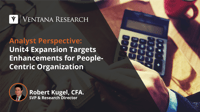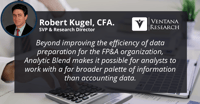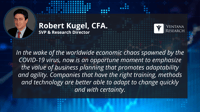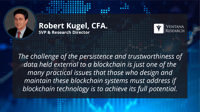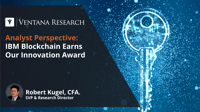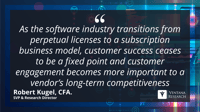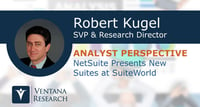I recently attended an analyst conference held by Unit4, an enterprise resource planning vendor focused on midsize organizations in people-centric industries. The conference was intended to communicate the company’s strategy, product updates and roadmap. The meeting took place shortly after announcement of the availability of Unit4 Industry Mesh and the acquisition of Compright, which does compensation planning as well as in the context of the broad technology shifts affecting ERP applications.
Read More
Topics:
Human Capital Management,
Office of Finance,
Business Planning,
Talent Management,
Financial Performance Management,
ERP and Continuous Accounting,
Total Compensation Management,
digital finance
Environmental, social and governance reporting by public corporations has become a top-of-mind issue for senior executives and boards of directors as countries increasingly consider or mandate its implementation in some form. The fundamental rationale for ESG reporting is rooted in the inability of purely financial measures to capture externalities (such as greenhouse gas emissions) or provide metrics that enable an objective assessment of management’s ability to properly determine trade-offs...
Read More
Topics:
Human Capital Management,
Office of Finance,
Business Intelligence,
Data Governance,
Data Preparation,
Data,
Financial Performance Management,
ERP and Continuous Accounting
One of the challenges of being a practically minded technology analyst is squaring the importance of “the next big thing” with the reality of what most organizations are doing. For decades it’s been the case that “the next big thing” in the world of information technology is easily several years ahead of where most organizations are in their use of technology. And before most organizations can realize the benefit of some whiz-bang technology, they frequently need to address a range of more...
Read More
Topics:
Human Capital Management,
Marketing,
Office of Finance,
Analytics,
Business Intelligence,
Sales Performance Management,
Financial Performance Management,
Price and Revenue Management,
Digital Marketing,
Work and Resource Management,
Digital Commerce,
Operations & Supply Chain,
Enterprise Resource Planning,
ERP and Continuous Accounting,
robotic finance,
Predictive Planning,
revenue and lease accounting,
Subscription Management,
intelligent sales,
AI & Machine Learning
I like Louis Pasteur’s observation that “fortune favors the prepared mind.” So-called black swan events happen regularly and can have a very negative effect on a business. Of course, risk is inherent in any commercial undertaking; organizations don’t succeed by being overly cautious and reckless ones usually fail after awhile. Those that are consistently successful are ones that manage risk intelligently. That is, they correctly identify vulnerabilities, avoid the decisions and situations where...
Read More
Topics:
Human Capital Management,
Office of Finance,
Continuous Planning,
Workforce Management,
Financial Performance Management,
Work and Resource Management,
Predictive Planning
I’ve written before about blockchain’s significant potential. A lot of the current discussion on the topic centers on cryptocurrencies and financial trading platforms, both of which are already in operation. However, my focus is on its applicability to business generally, especially in B2B commerce, where I believe there is significant potential for it to serve as a universal data connector. There’s also a great deal of potential for blockchain to provide individuals with greater power in ...
Read More
Topics:
Sales,
Human Capital Management,
business intelligence,
Business Collaboration,
Internet of Things,
Data,
Product Information Management,
Digital Commerce,
Enterprise Resource Planning,
blockchain,
candidate engagement,
collaborative computing,
continuous supply chain
By itself, data isn’t useful for business; the application of analytics is necessary to transform data into actionable information. Data analysis of one sort or another has long been a core competence of finance departments, applied to balance sheets, income statements or cash flow statements. Today, however, Finance must go beyond these basics by expanding the scope of the data being examined to include all financial and operational information that can yield actionable insights. Analysis thus...
Read More
Topics:
Customer Experience,
Human Capital Management,
Marketing,
Voice of the Customer,
business intelligence,
embedded analytics,
Learning Management,
Analytics,
Collaboration,
Data Governance,
Data Lake,
Data Preparation,
Information Management,
Internet of Things,
Contact Center,
Data,
Product Information Management,
Sales Performance Management,
Workforce Management,
Financial Performance Management,
Price and Revenue Management,
Digital Technology,
Digital Marketing,
Digital Commerce,
ERP and Continuous Accounting,
blockchain,
natural language processing,
robotic finance,
Predictive Planning,
candidate engagement,
Intelligent CX,
Conversational Computing,
Continuous Payroll,
revenue and lease accounting,
collaborative computing,
mobile computing,
Subscription Management,
agent management,
extended reality,
AI & Machine Learning
Ventana Research has awarded IBM its 2019 Digital Innovation Award. This award recognizes the vendor’s support for identity management using blockchain technology through IBM Verify Credentials. The application is a first, small step in establishing a blockchain-enabled system for decentralized identity management, a technology that ultimately will enable point-to-point exchange of information about people, organizations or things. This form of identity management has considerable potential in...
Read More
Topics:
Human Capital Management,
Collaboration,
Workforce Management,
Work and Resource Management,
blockchain
“Platform,” as used in the world of technology, originally referred to an operating system on which one could construct software applications. More recently, its usage has been expanded to apply to two types of business models. One enables third parties to create products and services that are complementary to a company’s core technology. For instance, both Apple and Salesforce have attracted a wide array of third-party software developers whose offerings greatly increase the value of each...
Read More
Topics:
Human Capital Management,
Marketing,
Office of Finance,
Voice of the Customer,
Continuous Planning,
Information Management,
Internet of Things,
Workforce Management,
Financial Performance Management,
Price and Revenue Management,
Digital Marketing,
Digital Commerce,
Operations & Supply Chain,
Enterprise Resource Planning,
ERP and Continuous Accounting,
robotic finance,
Predictive Planning,
revenue and lease accounting,
collaborative computing,
continuous supply chain
Identity management is an old problem that has taken on new dimensions in the digital world. In 1993, at the dawn of the World Wide Web (WWW),The New Yorkerran a cartoon featuring two dogs talking, one perched in front of a computer. The caption reads: “On the Internet, nobody knows you’re a dog.” The phrase quickly evolved into a meme highlighting the issue of identity uncertainty in the new digital environment.
Read More
Topics:
Human Capital Management,
Office of Finance,
Learning Management,
Internet of Things,
Data,
Workforce Management,
Digital Technology,
ERP and Continuous Accounting,
blockchain,
candidate engagement
I recently attended SuiteWorld, NetSuite’s annual user conference. In the opening keynotes and throughout the event speakers emphasized benefits for NetSuite users resulting from the merger of NetSuite and Oracle, completed last fall. I wrote about this at the time. NetSuite users are likely to benefit from Oracle’s sales and core technology infrastructure. Before the merger, NetSuite’s R&D spending was constrained by being a public company. The amounts needed to rebuild and extend its software...
Read More
Topics:
Human Capital Management,
Office of Finance,
Recurring Revenue,
Cloud Computing,
HRMS,
Enterprise Resource Planning,
ERP and Continuous Accounting
